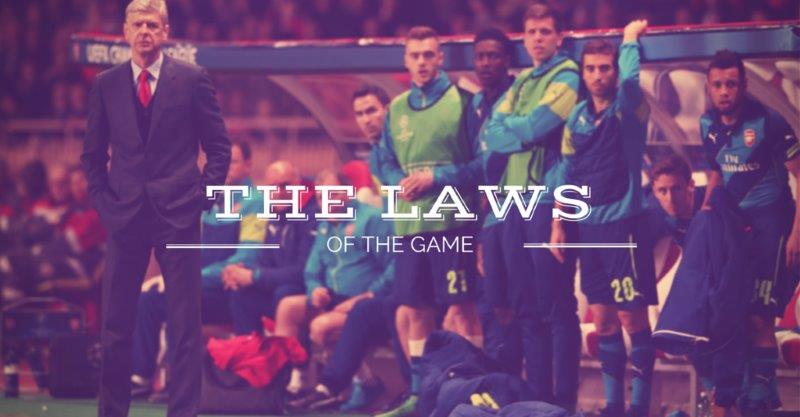As we reported on Wednesday, there are set to be a host of changes to the game ahead of the new season.
Some rules make great sense, like removing the triple punishment for ‘denying a clear goalscoring opportunity’ if it results in a penalty by issuing a yellow instead of a red, but some are just daft.
Here are all the rule changes as released by IFAB:
Law 01 – The Field of Play
- Artificial and natural surfaces may not be combined on the field
- Competitions may determine field size for their competitions (within Law)
- All commercial advertising on the ground must be at least 1m (1yd)
from boundary lines
- Logos/emblems of FAs, competitions etc… allowed on corner flags
(no advertising)
Law 02 – The Ball
None
Law 03 – The Players (new title)
- A match may not start/continue if a team has fewer than 7 players
- Substitutes may take a restart but must first step onto the field
- Clarifies situation when a player is sent off before/after kick-off
- Direct FK (or penalty) if a substitute/team official interferes with play
- If something/someone (other than a player) touches a ball as it goes into the goal the referee can award the goal if the touch had no impact on the defenders
- If a goal is scored with an extra person on the field and referee has restarted play the goal stands and match continues
Law 04 – The Players’ Equipment
- Any tape or other material on/covering socks must be same colour as the sock
- Player losing footwear/shinguard accidentally can play on until next stoppage
- Undershorts must be colour of shorts or hem; team must all wear same colour
- Electronic communication with substitutes is forbidden
- Player can return during play after changing/correcting equipment, once equipment has been checked (by referee, fourth official or AR) and referee signals
Law 05 – The Referee
- Decision can not be changed if play restarted or referee has left the field (HT+FT)
- If several offences occur at the same time the most serious is punished
- Referee can send a player off from pre-match pitch inspection onwards
- Referee can only use RC + YC after entering the field at start of the match
- Player injured by RC/YC foul can be quickly assessed/ treated and stay on field
- The equipment a referee can or may be allowed to use
- Diagrams of referee signals included (from Guidelines section)
Law 06 – The Other Match Officials (new title)
- More details about the duties of the assistants, AARs, fourth official
- Diagrams of assistant referee signals included (from Guidelines section)
Law 07 – The Duration of the Match
- More reasons for additional time (e.g. medical drinks breaks)
Law 08 – The Start and Restart of Play
- All restarts included (previously only kick-off and dropped ball)
- Ball must clearly move to be in play for all kicked restarts
- Ball can be kicked in any direction at kick-off (previously had to go forward)
- Referee can not ‘manufacture’ outcome of a dropped ball
Law 09 – The Ball in and out of Play
- If a ball rebounds off a match official it is in play unless it has wholly passed over a boundary line
Law 10 – Determining the Outcome of a Match (new title)
Kicks from the penalty mark:
- Referee will toss a coin to choose the goal (unless weather, safety, etc.)
- Player temporarily off the field (e.g. injured) at final whistle can take part
- Both teams must have same number of players before and during the kicks
- Clear statement of when a kick is over
- Kicks not delayed if player leaves the field; if not back in time kick is forfeited
Law 11 – Offside
- Halfway line ‘neutral’ for offside; player must be in opponents’ half
- Players’ arms not considered when judging offside position (including goalkeeper)
- Offside FK always taken where offence occurs (even in own half)
- Defender off the field only ‘active’ until defending team clear ball or play stops
- As above for attacker returning; before that re-entry point is the offside position
Law 12 – Fouls and Misconduct
- Foul with contact is a direct FK
- Advantage for a RC – indirect FK if offender then gets involved in play
- Change of wording for handball so that not every handball is a YC
- Some DOGSO offences in the penalty area are punished with a YC
- Attempted violent conduct is a RC, even if no contact
- Striking on head/face when not challenging an opponent is a RC (unless negligible)
- Offence against substitutes, team officials, match officials etc. is now a direct FK
- Foul off the field penalised with a direct FK on boundary line (penalty in own penalty area)
Law 13 – Free Kicks
- Difference between ‘stopping’ a FK and ‘intercepting’ the ball after FK taken
Law 14 –The Penalty Kick
- Indirect FK + YC if wrong player deliberately takes the penalty
- Indirect FK if ball kicked backwards
- If ‘illegal’ feinting occurs it is always an indirect FK (and YC)
- Goalkeeper YC if infringes and PK is retaken
Law 15 – The Throw-in
- New wording makes it clear that ball must be thrown with both hands
Law 16 – The Goal Kick
- If GK kicked into own goal it is a corner kick to opponents
- An opponent in the penalty area when the goal kick is taken can not play the ball first
Law 17 – The Corner Kick
- If CK kicked into own goal it is a corner kick to opponents
Full explanations of all the changes can be found in this PDF

